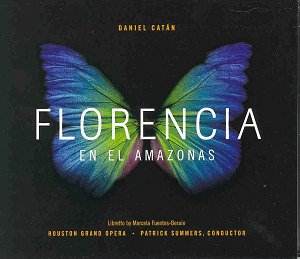Listeners still on a quest for a modern opera
that grips and bends the emotions in much the same way as Puccini
did must hear this work.
Daniel Catán was born in Mexico City in
1949. He now lives in Los Angeles and has received a commission
for a further opera for Houston Grand Opera. The stage is clearly
a maijor theme in his creative life. His two act opera Rappaccini's
Daughter was premiered in Mexico City in 1991 (recorded on
Newport Classic NPD85623/2 (Manhattan School of Music Opera Theater
and in excerpts on Naxos - reviewed here by Paul Shoemaker). There
is also the ballet Ausencia de Flores.
Catán writes that the moment of a butterfly's
birth is something that has been present in his mind as he composed
several of his works. The miraculous transformation into something
of great beauty yet is ephemeral on a human scale and of trembling
fragility is a powerful concept.
The plot of this opera is set aboard the 'El
Dorado' a steamboat plying the Amazon in the early 1900s. The
journey is from Leticia in Colombia to Manaus. Riolobo acts as
a mysterious narrator/Greek chorus rather like the old man in
Sondheim's Into the Woods or the elemental chorus of the
sea and the wind in Rutland Boughton's masterpiece The Queen
of Cornwall. Florencia, a diva returning after years of triumph
in the world's great opera houses (She recalls singing at La Scala
in scene 2) to sing in Manaus, travels incognito. For Florencia
this is to be a mystical transformational journey and the opera
builds inexorably to that moment of butterfly-epiphany.
The opera begins bright with light and
with the ecstatic rapture and pulsating chatter of birdsong. The
avian element recurs in tr. 6 CD1 and on CD2 tr.5 at 8.13. This
music has the exaltation of Martinů and the exoticism of
Villa-Lobos without the hectic vertical congestion that can afflict
the latter's jungle works. The music is intensely emotional in
Catán's sincerely adopted Puccinian approach. Listen to
the towering Scarpia-like call at the end of Act I. Then again
in scene 2 at 7.40 there is a cresting tension rising to climactic
Turandot-like heights at 8.29. Florencia's first aria attracts
well deserved applause in this live performance. The audience,
by the way, is well behaved throughout except for some over-eager
insensitivity at the very end of the opera.
In scene 3 Catán mobilises
an orchestral chatter that is part-Janáček, part-Petrushka
laced with the blackest portrayal of dread (2.03). Speaking
of the orchestral contribution I must also praise the great Houston
orchestra. It has lustrous strings as well as brass with plentiful
impact and grit.
I detected no weak links among the cast. In particular
Patricia Schuman is magnificent. Listen to her in scene 4 at 2.48
where her high note, long-held with power and without tremor,
is fully satisfying as is the summit moment in scene 8 at 2.50.
She also masters the softer effects as at tr.1, CD2, 5.40 where
she sings with touching tenderness. The vocal ensemble in tr.5
(CD2) is full of turbulence and superbly calculated complexity.
Again Puccini comes to mind but the psychology at work here also
reminds me of Sondheim and Paul Gemigniani in their grandest manner.
Act 2 emerges from the very same dogged foreboding
into which the end of Act 1 sank. This is gradually sloughed off
by the full panoply of a Maserati of an orchestra - including
a wind machine. I have mentioned Puccini as an influence but there
is also a touch of Korngold about this vibrantly lush and imaginative
writing.
In tr.2 at 1.55 and 5.10 Catán serves
up the most exalted and fluent love music with unflinching conviction
and eloquent sincerity. If Daphnis can be glimpsed in the
orchestral foreword to Act 1 it is the Odysseyan homecoming of
the final moments of Ma Mère l'Oye that rises triumphant
in scene 2 - that irresistible intoxicant of hesitation on the
brink of fulfiment. The grandeur of the river can be heard on
CD2, tr.6 at 4.33. This score is not short of nature magic.
Schuman delivers yet more climactic excitement
in tr.1 CD1 at 1.30 - almost Callas like. However the show is
by no means entirely Schuman's. In tr.5 listen to the quiet brass
snarl against the barking wonder of the great solo by Mark S Doss
as Riolobo.
One irritant is the behaviour of the audience,
just at the end of the opera. They succumb to crass insensitivity
by not allowing the score to fade into held silence. Instead one
or two predatory 'cheerleaders' incite applause before the last
note has sounded into nothingness. There are no marks here for
being first out of the slips.
The work is sung in Spanish but the booklet has
a parallel translation into English. The notes are extremely helpful
and include an essay by the composer and the librettist as well
as artist profiles. It is a pity that I was unable to find the
date and location of the recording sessions.
I am grateful to Walter Simmons for recommending
the work to me. I doubt that I would have heard it otherwise and
that would have been my loss.
This is a potently Puccinian opera and is not
to be missed by those thirsty for mystery, grandeur and emotional
staying power.
Rob Barnett
